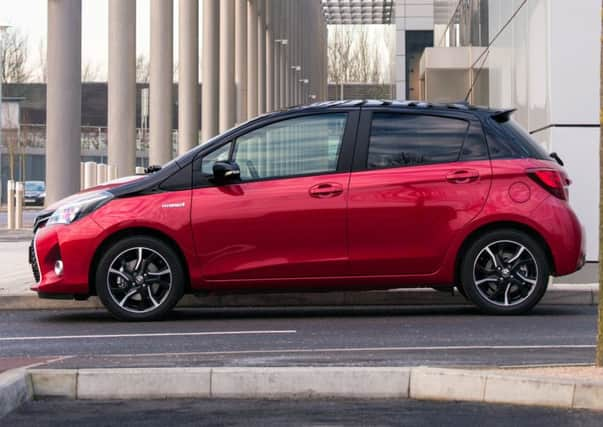Review: Toyota Yaris Hybrid need to have a quiet word


Except you can’t. Even after a week I had not tuned out the ear attack. The ride improved when I carried four sacks of sticks in the boot – adding weight which had been engineered out in the furtherance of economy and emissions.
Weight gives and it takes away. Reduce by 100kg and you’ll lop commensurate grams of carbon dioxide off the ratings by improving fuel economy. Tax codes benefit. Add weight and the ride settles down. Cars are set up to carry more than one person.
Advertisement
Hide AdAdvertisement
Hide AdI liked using the Yaris. A push button makes the electric motor ready and you can move off silently. Like most hybrids it will need the petrol engine after a few miles, sooner if there are inclines. It is simple to drive thanks to the seamless automatic gearbox and the punch at low speeds from the electric motor. The other motor, the 1.5 litre petrol engine, would be feeble on its own, delivering a mere 73 horse power and 82 lb ft torque without a turbocharger. The 59 horse power electric motor is its surrogate turbo, adding 125 lb ft of torque from kick-down, immediately, no delay, whoosh. Combine the petrol and electric figures and the result is 98 horse power plus an overlap of their torque output.
Hybrids are becoming common. Kia has joined the trend and is pleased with its Niro. Hyundais uses the same system in its IONIQ. You can even get a hybrid Porsche. Toyota (with Honda) has led the way and dominates world sales using hybrid power in its Lexus luxury models, too. Honda’s hybrids haven’t had the same impact and its hybrid offering in Britain is now nil, pending the arrival of the NSX supercar with three electric engines complementing the V6 petrol engine (I predict this is the head-turner of the decade).
Back to basics. Quick lesson: an electric engine adds power to the petrol engine. It gets its power from a heavy battery pack which is charged by the motion/braking of the car and the petrol engine. Peugeot has a diesel hybrid and racing hybrid diesels dominate long-distance circuit races with better economy and power, despite regulations to limit their advantage.
Your hybrid car is not racing at Le Mans. You want it for shopping and work and holidays and have probably bought it because you think it is worth the price premium over a petrol or diesel engine.
If you are buying a hybrid you are either (a) green or (b) economy minded or (c) green economiser or (d) misguided. Toyota’s own figures support a, b and c, to some extent. My Design hybrid has a list price of £17,395. The equivalent Yaris diesel, manual gears only, is £16,245 – so the automatic gears on the hybrid compensate for that price gap.
On economy the hybrid is rated at 78.5mpg overall. The diesel is 80.7mpg. However, in the urban test (remember these are not real life but laboratory simulations) the hybrid’s 91mpg is 14mpg better than the diesel. On C02 the hybrid’s 82g means no annual road tax. The diesel at 102g pays the lowest rate of £20 a year.
This is all supposing that you want a Yaris. There are lots of other very good small cars in this Fiesta/Corsa/Polo class but none with hybrid power since Honda’s Jazz went off the market. This unique hybrid low carbon proposition may be the best reason for the Yaris.
Toyota has made more than nine million hybrids. Its MIrai is the world’s first hydrogen fuel saloon car and is now in selected use in southern England, where Toyota GB is based. It has helped TGB win the award for low carbon car maker of the year. In Europe its hybrid sales are 45 per cent ahead this year. In all Europe one in three buyers choose hybrid, while nearly two in three Lexus buyers get a hybrid. In Western Europe these choices are 41 per cent for Toyota and 98pc for Lexus.
Advertisement
Hide AdAdvertisement
Hide AdOn the way are three more hybrids, the Toyota CH-R cross-over, the next generation Prius plug-in (with mains charging for the battery giving 30 plus miles on electric power) and a Lexus LC500h coupe.
As the urban mpg figures for the Yaris prove, hybrids make sense in town. Rome University found that a Prius hybrid regularly commuting for 1,400 miles travelled an average of 62 per cent on electric power. In purely urban areas the figure improved to 76 per cent. Almost 45 per cent of power came from the electric motor, with 34 per cent of the energy coming from braking and coasting. That’s clean driving. The other urban advantage is virtually silent running – which can be a danger for pedestrians who look with their ears before stepping out.
On test my Yaris Hybrid gave regular trip readings of around 55mpg, with a best score of 62mpg.
Verdict: If you want a small hybrid it’s Hobson’s Choice.